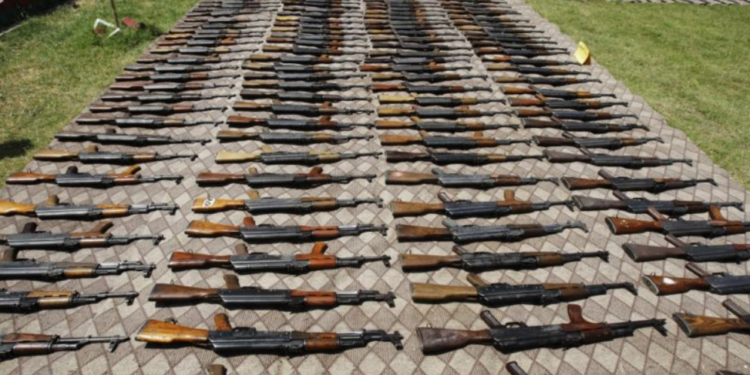Nigeria has recorded a dramatic escalation in its spending on arms, with weapons import climbing by a staggering 418% between 2022 and 2023, according to an analysis of the National Bureau of Statistics’ (NBS) foreign trade reports.
This surge in defence expenditure, ostensibly aimed at curbing the rampant insecurity plaguing the nation, raises critical questions about its effectiveness and the government’s underlying strategies.
Between January and September 2023, Nigeria’s expenditure on importing arms and ammunition soared to N125.18 billion, a significant leap from the N24.18 billion recorded during the same period in the previous year.

This increase in defence spending is particularly noteworthy considering the timing – a considerable portion of these imports were concentrated around the general elections period, suggesting a strategic move by the government to fortify security during this politically sensitive time or otherwise.
However, despite this considerable investment in foreign weaponry, the security situation in Nigeria remains dire, with kidnapping and other forms of violence continuing unabated. This situation highlights a troubling disconnect between the government’s heavy investment in arms and the persistent insecurity faced by Nigerians.
More Insights
- The stark increase in arms imports could be interpreted as a response to the growing insecurity and violence in the country. Nigeria also plans to make its own weapons and become an exporter of arms amid rising insecurity in the country.
- Nigeria has been grappling with various security challenges, including insurgencies in the northeast, banditry in the northwest, and communal violence in the central regions. However, the continued prevalence of these issues, even in the face of increased military spending, raises important questions about the effectiveness of Nigeria’s security strategy.
- There is also the possibility that some of the imported arms end up in the hands of criminals, further worsening insecurity.
- Despite a significant increase in spending on arms imports, the escalating insecurity in Nigeria is a complex and multifaceted issue that has far-reaching implications for the country’s stability and development.
- In January 2024 alone, Nigeria experienced a series of violent incidents, including attacks by Boko Haram insurgents, banditry, and communal violence, resulting in the loss of 261 lives in just nine days. Also, in the past seven years, Boko Haram insurgency caused2 million displacements in Borno, destroying 432 health centres and 900,000 houses.
- This trend of violence is a continuation of the alarming rates of kidnapping and killings witnessed in the country. For instance, in 2023, over 3,600 people were kidnapped, marking the highest number on record, and almost 9,000 Nigerians were killed in conflict-related incidents.
- The persisting insecurity is driven by a variety of factors, including jihadist attacks in the Northeast, rampant kidnapping and banditry in the Northwest, and long-standing communal conflicts in the central regions of the country.
- The situation is exacerbated by the inadequacies in the policing system. For example, the Nigeria Police Force, with over 371,000 officers, is overwhelmed and struggles to maintain a permanent presence in many parts of the country. This has necessitated military deployment across all 36 states and the Federal Capital Territory, diverting their focus from their primary territorial defence role.
- Addressing these challenges requires a holistic approach that goes beyond military solutions. It involves tackling the root causes of insecurity, such as poverty, unemployment, and social inequality, and adopting a more community-focused strategy. This strategy would involve better equipping and training security forces, ensuring transparency in defence spending, and fostering collaboration between security forces and local communities for improved intelligence gathering and trust building.
- The recent efforts by the police and other security agencies, including the rescue of kidnapped victims and the arrest of suspects, demonstrate some progress. However, the scale of the challenge demands more concerted and sustained efforts from both the government and the international community.








